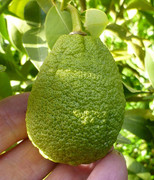Am I driving myself nuts for nothing chasing the US-942?
Yes!
A rootstock chosen for best commercial use for Florida is irrelevant to growing in pots in Montreal.
You have completely different climate, soil type and likely pests and diseases.
There is no published research on rootstocks for your conditions because there is no commercial imperative to carry it out.
You should consider the following points.
Tree size in pots is controlled mostly by the size of the pot.
If there is any danger of frost, choose a Poncirus trifoliata rootstock - but presumably in Montreal you keep heated in winter so that's likely irrelevant. However, it may be best against phytopthera root rot which can be a problem in cool conditions.
With possibly low light conditions in winter a vigorous rootstock might be best to get good growth for the months when possible. Most citranges and citrumelos are vigorous and root rot resistant. Here in UK, I find Rough Lemon good if you ensure excellent drainage. You will read that fruit quality is not the best, but at least it does produce results in imperfect citrus climates.









